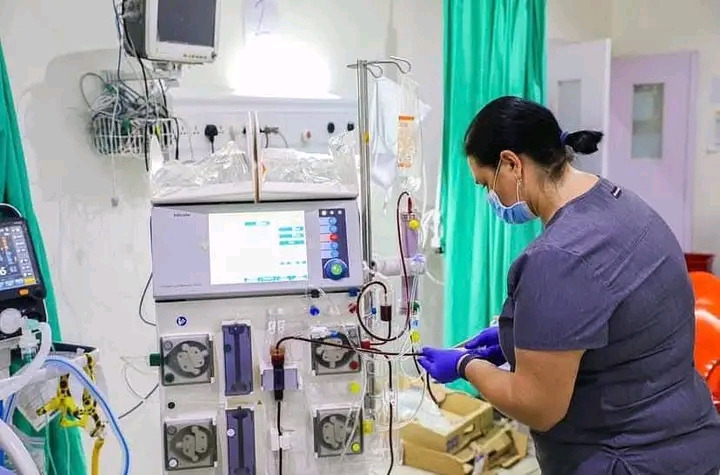Kidney disease, once considered a health concern primarily for the elderly, is now increasingly affecting younger Nigerians. Medical experts have raised alarms over the growing number of young adults and even adolescents diagnosed with chronic kidney disease (C K D ) and kidney failure.
This trend is particularly troubling in Nigeria, where healthcare infrastructure is weak, and treatment options like dialysis and transplants are expensive and inaccessible to a greater number of the population.
Several factors contribute to this disturbing rise, including lifestyle changes, poor dietary habits, lack of awareness, and limited access to quality healthcare.
This article explores the causes, implications, and potential solutions to Nigeria’s growing kidney disease epidemic among its young population.
The Growing Burden of Kidney Disease in Nigeria
According to the Nigerian Association of Nephrology (NAN), over 24 million Nigerians, roughly about 15% of the population suffer from some form of kidney disease.
Even more concerning is the increasing number of young patients, many in their 20s and 30s, presenting with advanced kidney failure.
Hospitals across major cities like Lagos, Abuja, and Port Harcourt report a surge in young dialysis patients, a trend that was rare two decades ago.
Kidney disease is often called a “ silent killer ” because symptoms may not appear until the condition has reached an advanced stage.
By then, the damage is usually irreversible, leaving patients dependent on lifelong dialysis or kidney transplants, both of which are financially out of reach for most Nigerians.
Why Are More Young Nigerians Developing Kidney Disease?
Several factors contribute to the rise of kidney disease among Nigeria’s younger population include:
1. Unhealthy Dietary Habits.
The shift from traditional Nigerian diets to processed and fast foods has introduced excessive salt, sugar, and unhealthy fats into daily meals.
High salt intake is a major risk factor for hypertension, which is a leading cause of kidney damage.
Additionally, excessive consumption of sugary drinks and energy beverages has been linked to obesity and diabetes, which are two major contributors to kidney disease.
2. Increased Use of Harmful Herbal Remedies and Unregulated Medications
Many young Nigerians self-medicate with over-the-counter painkillers (like ibuprofen and paracetamol and antibiotics) and unapproved herbal concoctions.
These substances can cause kidney toxicity when used excessively or without medical supervision.
Some herbal remedies contain heavy metals or toxic compounds that could damage the kidneys over time.
3. Rising Cases of Hypertension and Diabetes
Hypertension and diabetes are the two leading causes of kidney failure worldwide.
Unfortunately, these conditions are becoming more common among young Nigerians due to sedentary lifestyles, stress, and poor eating habits.
Many young people remain undiagnosed until they develop severe complications like kidney failure.
4. Lack of Clean Water and Exposure to Toxin.
In many Nigerian communities, there is limited access to clean drinking water. Contaminated water sources may contain heavy metals, industrial pollutants, or harmful bacteria that strain the kidneys.
Also, exposure to pesticides and chemicals in poorly regulated environment contributes to kidney damage.
5. Low Awareness and Late Diagnosis.
Most young Nigerians are unaware of the early signs of kidney disease, such as fatigue, swelling in the legs, frequent urination, and high blood pressure.
Due to limited healthcare access, many only seek medical help when their kidneys are already failing .
Routine medical check-ups are rare, allowing kidney diseases to progress undetected.
6. Genetic and Socioeconomic Factors
Some individuals have a genetic predisposition to kidney disease, especially those with a family history of hypertension or diabetes.
Additionally, poverty limits access to quality healthcare, nutritious food, and safe living conditions, increasing vulnerability to kidney-related illnesses.
The Devastating Impact on Young Lives
Kidney disease doesn’t just affect physical health, it disrupts education, careers, and family life. Young patients often face:
• Financial Strain.
Dialysis costs between ₦30,000 to ₦70,000 per session in Nigerian Hospitals, and patients typically need three sessions per week. Kidney transplants, though more sustainable, cost millions of naira, making them unaffordable for most families and patients.
• Mental Health Challenges.
Depression and anxiety are common among kidney disease patients due to the stress of treatment and uncertainty about survival.
• Social Stigma.
Some communities wrongly associate kidney disease with spiritual attacks or immoral behavior, leading to isolation and discrimination. Possible Solutions to Curb the Epidemic
To reverse this trend, Nigeria must adopt a multi-faceted approach involving public health education, policy changes, and improved healthcare infrastructure.
1. Public Awareness Campaigns:
Government and non-governmental organizations should launch nationwide campaigns to educate young Nigerians on kidney health, emphasizing:
– The dangers of excessive salt, sugar, and processed foods.
– The risks of self-medication and unapproved herbal remedies.
– The importance of regular blood pressure and blood sugar checks.
2. Improved Access to Healthcare :
– Subsidized Treatment: Government intervention to reduce the cost of dialysis and provide financial aid for transplants.
– More Nephrologists: Training and deploying more kidney specialists to public hospitals.
– Early Screening Programs: Free or low-cost kidney health screenings in schools, workplaces, and communities.
3. Regulation of Food and Drug Safety:
– Stricter enforcement of food safety laws to reduce harmful additives.
– Crackdown on fake and unregulated drugs, including dangerous herbal mixtures.
4. Promotion of Healthy Lifestyles:
– Encouraging physical activity and balanced diets from an early age.
– Workplace wellness programs to monitor employee health.
5. Investment in Clean Water and Environmental Safety:
– Government and private sector initiatives to provide clean drinking water.
– Stricter regulations on industrial waste disposal to prevent water contamination.
In Conclusion, the rise of kidney disease among Nigeria’s younger population is a public health emergency that demands urgent action.
Without intervention, millions of young Nigerians risk losing their lives to a preventable and manageable condition.
By increasing awareness, improving healthcare access, and promoting healthier lifestyle, Nigeria can stem this deadly tide and safeguard the future of its youth.
The time to act is now, before kidney disease claims even more lives.
